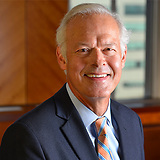If you had to choose a top-ten list of the most important and influential modern books by a professional historian about American history, the list would surely be incomplete without Gordon S. Wood and his Pulitzer Prize winner: "The Radicalism of the American Revolution". Cited by Supreme Court Justices, authoritatively insightful about America's founding times and people, widely respected by leading constitutional scholars, an inspiring text, Professor Wood's masterpiece continues its influence.
That said, constitutional understanding needs some serious help in a Digital Age where constitutional issues are miniaturized into tweets, where news is instant and fleeting, where media is fragmented. Ironically, the popular lens on our Constitution is shrinking at the same time the number of constitutional issues is expanding into virtually every aspect of daily American life (speech, marriage, religion, property, guns, voting and so on).
Why is Gordon Wood's book so important? It brings to life the monumentality of the cultural changes--still ongoing--brought about by the American Revolution. This Revolution was not, as Gordon Wood shows, just political. It set in motion the culturally broad idea of popular sovereignty: the radical idea that a new order must replace monarchy and all its old world perks and privileges, its values of dependence that tied the lives of common people to the monarch's will, its presumption that common people weren't good enough to rule or speak for themselves. Once unleashed, popular sovereignty gave birth to a ratified We the People Constitution, a concise, popularly readable composition unlike any other in history.
Professor Wood's work asks us to really see how revolutionary this popular sovereignty idea was. But brilliant scholarship like Professor Wood's isn't itself sufficient.
It needs broader popularization so people connect with their Constitution and its history.
The Constitution's lifeblood is its modern cultural reality: that is, how it plays out in the everyday lives of We the People and how well or not we use its principles as the glue for a more perfect Union.

